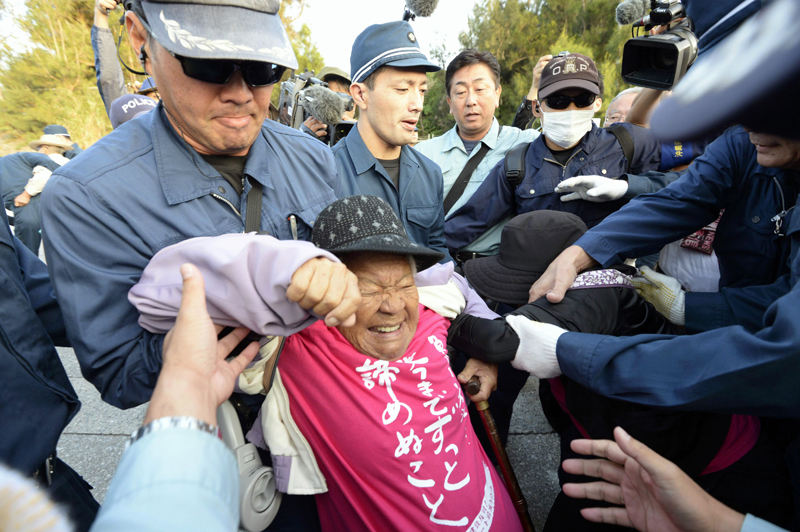Japan overrides protests, resumes work on US base transfer
One of the protesters against the relocation of US Marine Air Station Futenma is carried away in front of the gate of Camp Schwab, an American base near the planned relocation site, in Nago, Okinawa Prefecture Thursday, October 29, 2015. Photo: Kyodo News via AP
TOKYO: Japan resumed construction work needed to relocate a US air base from one area of Okinawa's main island to another on Thursday, overriding vigorous protests by local residents.
The land reclamation work on Henoko Bay came as police dragged away opponents of the plan who were seeking to block access to the area. Protesters also heckled workers from canoes offshore.
Local residents object to living nearby US Marine Air Station Futenma and want the base moved out of Okinawa. Current plans call for moving it to a less developed area on the island called Henoko.
The central government in Tokyo contends that the work should be done as soon as possible to alleviate worries over safety at the air base, which is surrounded by homes, schools and other civilian facilities.
The central government had suspended the work in August to allow time for talks on a compromise. Okinawa's governor revoked his predecessor's approval for the plan, but that decision was overridden by the Transport Ministry.
"It's totally dictatorial," Gov. Takeshi Onaga, told reporters. "I will firmly fight against this."
Onaga, who was elected last year on promises to fight the move, is expected to appeal the decision to resume work in Henoko to an arbitration panel.
The chief Cabinet secretary, Yoshihide Suga, left Thursday for Guam, where he was due to tour sites that might also be used for relocation of US military facilities. Suga and other top officials have said they are counting on the Okinawan people's "understanding" of the relocation plan.
Okinawa houses more than half of the 50,000 American troops stationed in Japan and US bases occupy nearly a fifth of the land on its main island. But the local government says the bases are a drain on the economy, providing less than 5 percent of its business activity and employing only 1.4 percent of its workers.
Some in Okinawa oppose the land reclamation in Henoko for environmental reasons. Greenpeace activists say their ship the Rainbow Warrior III is due to arrive in Okinawa this weekend to help support those opposed to the construction.
The dispute over relocating Futenma also symbolises centuries-old tensions between Okinawa and the Japanese mainland, which annexed the islands, formerly the independent kingdom of the Ryukyus, in 1879. In the final days of World War II, Okinawa became Japan's only home battleground, and the island remained under US rule for 20 years longer than Japan's 1952 emergence from the American occupation.




